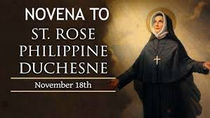The Guardian Angel: Eucharistic Miracle of Blanot, France 1331
- Donald Hartley
- May 10, 2021
- 4 min read

The Eucharistic miracle of Blanot took place during the Easter Mass of 1331. During Communion, a Host fell to a cloth that was held below the communicant’s mouth. The priest tried to pick up the Holy Eucharist, but it was not possible. The Host had transformed into Blood, resulting in a stain the same size as the Host, on the cloth. That cloth is preserved today in the village of Blanot.
In the 14th Century, Blanot was a small village in the center of France and part of the diocese of Autun. The bishop of this town, Pierre Bertrand, was involved in certain canonical discussions with an official of his curia, Jean Jarossier, which resulted in documentation that gives us many details about this Eucharistic miracle.
The miracle occurred on Easter Sunday, March 31, 1331, at the first Mass of the day, which was offered by Hugues de la Baume, the vicar of Blanot. One of the last people to receive Communion was a woman named Jacquette, the widow of Regnaut d’Effour. The priest placed the Host on her tongue, turned, and started walking toward the altar. He did not notice that a Particle from the Host fell and landed upon a cloth that covered the woman’s hands.
Thomas Caillot, who was assisting at the Mass went to the altar and said: “Father, you must return to the rail because the Body of Our Lord fell from the mouth of this lady onto the cloth.” The priest immediately went to the woman, still kneeling at the railing, but instead of finding the Host on the cloth, he saw a small spot of Blood.
When Mass was over, the priest took the cloth into the sacristy and placed the stained area in a basin filled with clear water. After washing the spot and scrubbing it numerous times, he found that it had become darker and larger (reaching about the size and shape of a Host). Moreover, the water in the basin turned Bloody.
This square of cloth was reverently placed in the tabernacle. Every year, on the feast of Corpus Christi, the relic is solemnly exposed in the church of Blanot. An additional note: The Hosts that remained in the ciborium after the distribution of Holy Communion on that Easter Sunday were also returned to the tabernacle, never to be distributed. Hundreds of years later they were found to have been perfectly preserved.
ST. LEO I (Alt)"When the Lord says: 'Unless you shall have eaten the flesh of the Son of Man and shall have drunk His blood, you shall not have life in you,' you ought to so communicate at the Sacred Table that you have no doubt whatever of the truth of the Body and the Blood of Christ. For that which is taken in the mouth is what is believed in faith; and in do those respond, 'Amen,' who argue against that which is received." -"Sermons" [91,3] ante 461 A.D.
ST. CAESAR OF ARLES (Alt)"As often as some infirmity overtakes a man, let him who is ill receive the Body and Blood of Christ." -"Sermons [13 (265), 3]
ST. FULGENE OF RUSPE (Alt)"Hold most firmly and never doubt in the least that the Only-begotten God the Word Himself become flesh offered Himself in an odor of sweetness as a Sacrifice and Victim to God on our behalf; to whom, with the Father, and the Holy Spirit, in the time of the Old Testament animals were sacrificed by the patriarchs and prophets and priests; and to whom now, I mean in the time of the New Testament, with the Father and the Holy Spirit, with whom He has one Godhead, the Holy Catholic Church does not cease in faith and love to offer throughout all the lands of the world a sacrifice of Bread and Wine … In those former sacrifices what would be given us in the future was signified figuratively; but in this sacrifice which has now been given us, it is shown plainly. In those former sacrifices it was fore-announced that the Son of God would be killed for the impious; but in the present it is announced that He has been killed for the impious."
"And according as we say, "Our Father," because He is The Father of those who understand and believe; so also we call it "our Bread," because Christ is The Bread of those who are in union with His Body. And we ask that this Bread should be given to us daily, that we who are in Christ, and daily receive The Eucharist for the Food of Salvation, may not by the interposition of some heinous sin...be separated from Christ's Body."
- St. Cyprian (210?-258)
When we say "Give us this day our daily bread," by "this day" we mean "at this time," when we either ask for that sufficiency, signifying the whole of our need under the name of bread, which is the outstanding part of it, or for the sacrament of the faithful, which is necessary at this time for attaining not so much this temporal as that eternal happiness."
- St. Augustine
"It is happiness to be in heaven, no doubt, because it is to be with Jesus; but have we not almost the same happiness here? Do we not possess Him in the Most Holy Sacrament? Did we but know how to profit by His Divine Presence, we should in some way have no reason to envy the inhabitants of the Heavenly City."
- Marie Estelle Harpain (1814-1842)
Post not marked as liked










